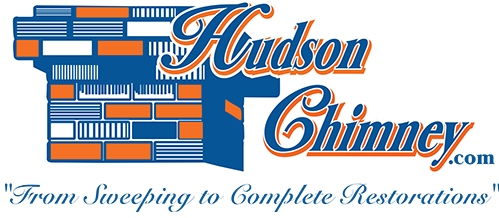by Mark Hudson | Aug 25, 2014 | chimney maintenance
There are a lot of risks involved with having a chimney. Chimney fires, carbon monoxide poisoning, and expensive repairs are some of the more worrisome problems. However, you can protect your home, your health, and your wallet easily with early preventative maintenance. Hudson Chimney can inspect and clean your chimney, make sure it is properly installed, and make and carry out recommendations that will keep your home safe and maintained.
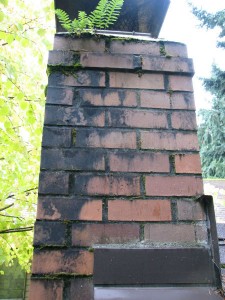
One easy way to prevent chimney fires and ventilation problems is to have your chimney cleaned professionally. The Chimney Safety Institute of America recommends that you have your chimney swept annually. Whenever you use your chimney, a substance called creosote builds up. Creosote is both highly flammable and blocks smoke and gasses from leaving your home. Furthermore, creosote can build up into glazed creosote, which has to be removed by a professional with chemicals to avoid ruining your chimney. The professionals at Hudson Chimney would be more than happy to inspect your chimney for creosote buildup and clean it to provide you with a safer home.
Water that enters your chimney can also cause extensive water damage, including mold growth, insulation damage, and even the destruction of your chimney. In order to prevent water from entering your home through your chimney, you should have Hudson Chimney install a cap or damper (every chimney should have one of the two). A cover will not only prevent water from entering and damaging your home, but it will also prevent animals and other debris from getting inside your chimney. Keeping your chimney clear of animals and debris is important for proper ventilation and keeping toxins out of your home.
Water can also seep through the brick or mortar of your chimney, however. This can also cause water damage to your home as well as cause cracks to form and be enlarged, shortening the life span of your chimney. Therefore, it is important to have Hudson Chimney apply a repellent to your chimney stack. A repellent will prevent water from seeping into the materials of your chimney while still allowing it to breathe, which enables water produced in your chimney to leave it.
You should have Hudson Chimney inspect your chimney to make sure that it is also installed correctly. Sometimes an appliance can have a flue that is too big or too small for it, causing draft problems. With a flue that is too small, ventilation will not occur properly, allowing toxins to enter your home. With a flue that is too big, on the other hand, creosote will quickly build up, causing a fire hazard and also preventing proper drafting.
If you are worried about the potential disasters your chimney can cause, you will find how easy it is for you to protect yourself and your home by calling Hudson Chimney. They will make sure that your chimney is working safely and efficiently and put your mind at ease.
by Mark Hudson | Jul 15, 2014 | chimney maintenance, fire safety, fireplaces

It’s important to know what could happen if you keep on ignoring your chimney’s needs. Negligence on your part might bring you to regret not taking care of it.
If you have ever wondered why the Chimney Safety Institute of America (CSIA), along with numerous other fire safety and government health organizations, recommend an annual chimney sweeping and inspection, “dirty chimneys kill.” While we are not trying to scare you into scheduling your yearly chimney cleaning, Hudson Chimney would like to tell you exactly why you need an annual chimney sweep and inspection, so you can understand the urgency behind following this important step of chimney maintenance.
1. A chimney sweeping removes the buildup of creosote from the walls of your chimney.
If you burn wood, creosote will occur naturally during condensation from when smoke, gases, and vapors from your fireplace exits the upper, cooler walls of your chimney. Sticking around as a residue, creosote can be black or brown and varies in appearance. Whether it is shiny and hard, crusted and flaky, or gummy and tar-like, creosote is highly combustible. If enough of the creosote residue builds up in your chimney and the internal flue reaches high temperatures, you have the makings of a dangerous chimney fire. An annual chimney cleaning from a CSIA-certified company like Hudson Chimney can remove creosote deposits before they can become large enough to ignite a fire.
2. A chimney inspection will alert you to any water penetration damage that might exist in your chimney.
If you own a masonry chimney, you should know that the CSIA has called water the number one enemy of the bricks and mortar of your chimney. For good reasons, water penetration can cause extensive and expensive damages and repairs to masonry fireplaces and chimneys. From loose bricks and mortar to rusted appliances to serious structural deterioration, the destruction caused by water can be alarming. Hudson Chimney can find the leak that is causing the damage, repair the leak and damage, and then apply a waterproofing sealant to prevent any more water penetration of your masonry chimney.
3. A chimney sweeping and inspection can prevent toxic gases like carbon monoxide from entering your home.
Unfortunately, cases of carbon monoxide poisoning are on the rise, due to the focus on energy-efficiency. While the temperate air is sealed in, saving you money, the toxic by-products of combustion are also sealed inside, as air flow has been restricted. If there is not enough oxygen coming in to completely burn the fuel, carbon monoxide is produced, and since you cannot see, smell, or taste it, you and your family could be breathing it in for quite a while. A CSIA-certified inspection from Hudson Chimney will ensure the drafting and venting is working to keep the air flow going through the house, bringing oxygen to the heating source. A sweeping will also remove any possible blockages like animal nests to prevent another source of carbon monoxide invading your home. If you and your family develop flu-like symptoms that do not disappear, ask your doctor for a carbon monoxide blood test to be sure your health is not at risk.
If you have not scheduled your annual chimney sweeping and inspection this year, contact Hudson Chimney today. Proper chimney maintenance begins with this important step.
by Mark Hudson | Jun 27, 2014 | chimney maintenance, fireplaces
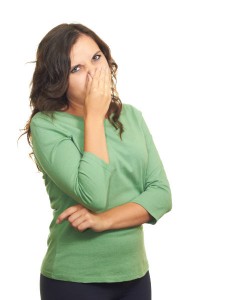
Can’t bear that unpleasant odor coming from your fireplace? It’s time for an inspection and thorough cleaning. Schedule an appointment today.
If your home has the strong, musty, smoky smell of an old cabin in the woods—but that’s not exactly the effect you were going for—and the origin of the smell seems to be your chimney and/or fireplace or stove, there is hope.
Being the owner of a well-loved and often-used fireplace does not mean you have to live with that overpowering fireplace odor. A trained chimney sweep will be able to suss out the cause of the smell and plot an effective plan for removal.
Why Does My Fireplace Smell?
Even though odors don’t usually vary much from fireplace to fireplace—hence most people know exactly what we mean when we say “that campfire smell”—this smell can actually be caused by a number of factors. The important thing to focus on isn’t why your chimney smells smoky; it smells smoky because it has likely accumulated soot and creosote from the fires you burn. Instead, you should focus on why this smoky odor is being dragged into your house. Ordinarily there is a problem with proper venting or with air pressure—both issues that can easily be addressed.
If you live in or around the Jacksonville, Florida, area—where we have worked for more than 30 years—one of Hudson Chimney’s certified chimney technicians will be able to determine the origin of your chimney’s odor. In the meantime, here are a few possible culprits:
- Dead animals or animal infestations are in your chimney; once the animals are removed, this problem can be easily remedied by adding a chimney cap or top-sealing damper to prevent animals from entering in the future.
- A clothes dryer, bathroom vent fan, or another appliance is exhausting air outside your home, and as a result negative air pressure is drawing outside air into your home through your chimney.
- If you have two or more chimneys, they may be competing for air pressure. This is known as “smoke crossover,” and occurs when a fire is exhausting from one chimney, causing the other chimney to draw in air and drag smoke in along with it.
How Do I Deodorize My Chimney?
If it’s been a long while since your chimney was professionally inspected and cleaned, those of us at Hudson Chimney will probably recommend that you start there. It’s kind of like having a physical if you haven’t been to the doctor in a long while. A thorough chimney and fireplace cleaning and sweeping will see to it that excess creosote and combustion byproducts—all of which are strong-smelling—are removed along with any animal nests or blockages.
If there is a backdrafting issue, no thanks to the recent addition of a range hood or energy efficient-windows, for example, your chimney technician will be able to recommend ways to allow your house to “breathe.” Beyond that, there are many proven methods for deodorizing and preventing chimney odors.
Have questions about chimney odors? Call Hudson Chimney today.
by Mark Hudson | Jun 10, 2014 | chimney maintenance

Leaky chimney got you down? Give the pros at Hudson Chimney a call!
Hudson Chimney has been giving quality chimney services for over thirty years now. And throughout our experience, we’ve collected a considerably wide knowledge when it comes to chimney problems and issues.
One of the most common issues that we’ve encountered throughout our experience is the case of the leaky chimney. Seven out of ten households with chimneys have been complaining about leaks and are asking for help to resolve said issue.
Here are a few things that you may find informative and rather helpful.
The common causes of chimney leaks:
- Although chimneys are generally concrete, there are cases wherein only the outside is solid and the inner portion is filled with solid fillers. According to the Chimney Safety Institute of America, majority of the masonry materials utilized are actually porous and are prone to absorbing water. The process of filling the brick plus the nature of the materials used makes the brick more susceptible to having cracks and channels that may serve as an entrance for water. One cracked brick is relatively harmless. But imagine fifty bricks or more? The amount of water that can pass through that is enough to cause an annoying leak around your house.
- For aesthetic purposes, many people make use of fashionable bricks in their chimneys. These bricks are more porous and rough on the surface compared to its regular counterpart. The key thing to look out for when using fashionable bricks is its flashing. The most preferred and advisable flashing to utilize is either the lead, lead coated copper or the copper (gold).
- Chimney flashing is done to prevent leakage. But sometimes when flashing is improperly installed, worn, inadequate or even corroded, this would backfire and cause what it’s meant to prevent in the first place.
Warning signs that your chimney is leaking:
- When you hear a constant, omnipresent dripping noise.
- Cracks and deterioration in the flue lining
- Water stains on or around your chimney
What you can do to fix it!
Your first instinct once you suspect your chimney is leaking is to go up there and see for yourself if there’s anything amiss. Although this is relatively the first thing you can do, it’s not as practical and effective as you may think. 80% of the time, people without training won’t be able to detect a leaky chimney or know how to remedy it. The quick and effective solution? Call our professionals and schedule an appointment as soon as possible so we can have your chimney waterproofed as well as install a chimney cap or crown!
by Mark Hudson | May 27, 2014 | chimney maintenance
Carbon monoxide poisoning can be fatal. It can also cause other unpleasant symptoms like headaches. If your chimney is not regularly cleaned and inspected, obstructions can interrupt the flow of air…putting you in danger.
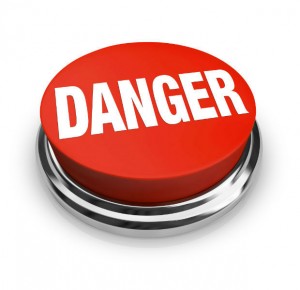
If anything clogs the air flow or draft in your chimney, you are at risk for carbon monoxide poisoning.
The Facts
Carbon monoxide is a toxic gas that is formed through moisture, incomplete combustion and negative air pressure. It usually happens when there are people who smoke in the house, fuel-burning devices most especially in your chimney. Carbon monoxide is common inside the chimney because of the air that goes in and out of the chimney and also the particles that come from open combustion; complete or incomplete.
It cannot be seen, felt and also doesn’t have any odor. When you experience symptoms like nausea, headache and fever that are all too familiar, you tend to think it’s just a case of the common flu. So you don’t have it examined by a medical professional. However, only a thorough medical examination by your doctor can determine whether or not it is carbon monoxide poisoning. A piece of advice: when you feel ill, go and see your doctor. Early diagnosis and treatment will benefit you in the long run.
Prevention
To proactively stop carbon monoxide from entering your home, it’s always good to have your chimney checked ad swept regularly. Also, the use of carbon monoxide detectors or alarms can prove to be very useful. They help in determining if carbon monoxide is present inside the house and if it is mild or already too dangerous.
A chimney cap will also help big time. It will lessen the chances for water to seep in since it’s the number one cause of most of the problems in the chimney. It can also prevent any bad air from coming in and allowing bad smoke to also go out properly.
We have been serving the beautiful people in the northeastern part of Florida for over thirty years now, we are proud of the services we provide. Let us become your trusted source for all things chimney.
by Mark Hudson | Apr 24, 2014 | chimney maintenance, fire safety
Problems in your chimney’s flue can pose a threat to your family’s health and safety. It is important to have a fully-functional and efficient chimney liner. Here’s what you need to know:
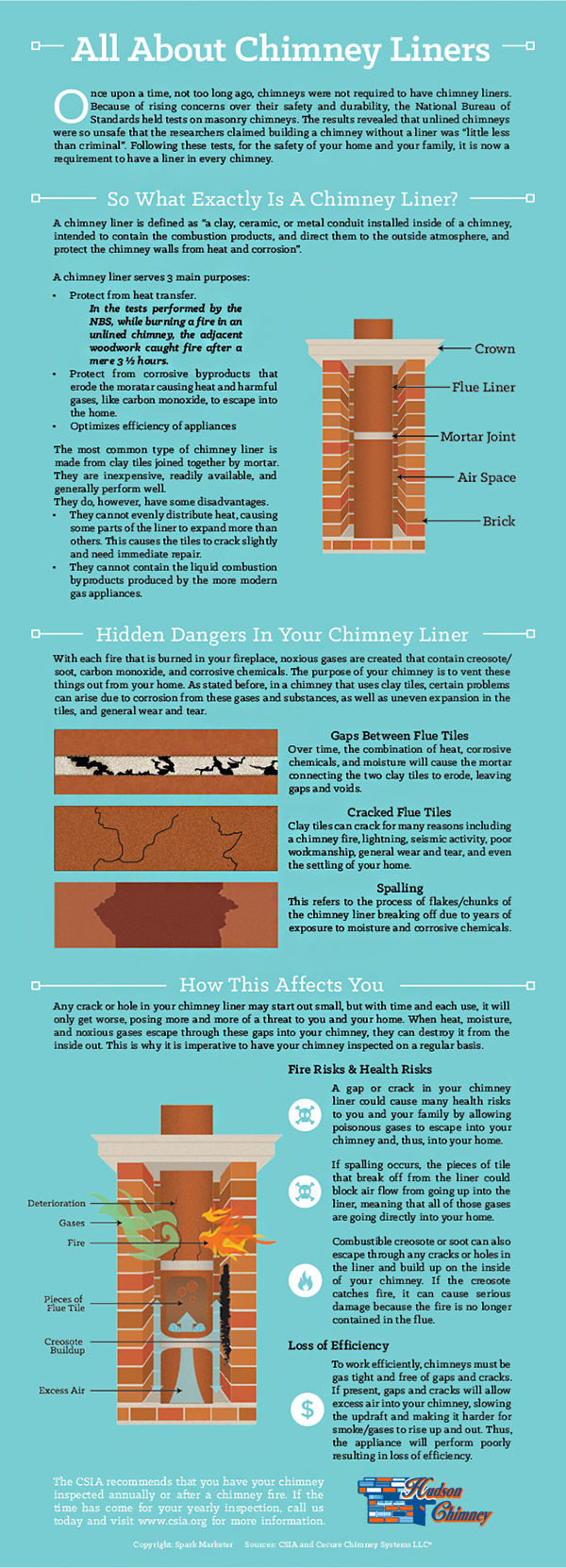
Is smoke coming in instead of going out? If you think your chimney liner needs repairing or replacing, Hudson Chimney can offer you the best services.
